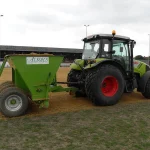When it comes to adding manure to your garden or allotment, there are guidelines you should follow as manure can cause harm to the health of both plants, crops and humans. Thanks to its high nutrient and mineral content, manure is great for mixing into those garden borders to encourage root growth and health, but when exactly should you apply manure to your garden or vegetable patch.
In this guide, we explain what organic manure is and when you should put manure on your flower beds, vegetable patches and potted plants.
Contents
What is manure?
Manure is organic matter that is used as a fertilizer in gardening and agriculture, with the majority of manure consisting of animal faeces and bedding straw. The most common types of organic manure are:
- Animal manure
- Compost manure
- Green manure
Manure is available in many varieties, but they are typically grouped into three main types. Each type has its own benefits, but the main objective is to provide extra nutrients to the soil. To find out more about the different types of manure, head over to our extensive manure guide.
When to put manure on gardens
When it comes to putting manure on your garden, there are guidelines and advice you should follow. You should look for the specifications of the manure like the animal it has come from, the age of the manure, and the composting time it has gone through. Fresh manure may sound like the best option to many gardeners and landscapers, but in reality, it isn’t – plants are at risk from E.coli, salmonella and other harmful bacteria when fresh manure is applied. (Let the manure dry and age in order to achieve the best results for your garden).
As a rule of thumb, applying manure to your garden should be made at least three months prior to full growth, meaning the best time to add manure to your garden is in the late autumn or winter. You should add organic manure to your garden at the same time each year, as this will produce the optimal levels of nutrients and drainage for your garden.
When to put manure on flower beds
Many gardeners like to add manure to flowers such as roses, tulips and sunflowers and for good reason too! Blending manure into the top layer of topsoil will help encourage root growth and health because the manure is packed full of nutrients. The main nutrient released is nitrogen which is needed for plants and vegetables to grow in a sustainable manner. Manure also contributes to an improved soil structure, resulting in better infiltration and retention of water – perfect for plants.
For flower beds that have reasonable growing ground, you should spread manure (well-rotted horse manure is the best option) over the soil in early March. With poorer or drier soil types, you should add manure in late March or early April. Adding manure to roses should be done in early to mid-March. If you’re looking to grow healthy roses, see our guide on whether you should add horse manure.

When to put manure on vegetable patches and gardens
Because of the potential of transmitting harmful bacteria to humans, such as E. coli, fresh manure should never be used on vegetables or fruits. If you are growing produce where the edible portion is in contact with the soil such as carrots, or potatoes, you should apply manure at least three months prior to harvest.
With just a four month growing season, this means you should only apply manure in the late autumn or winter.
When to put manure in potted plants
Potted plants require extra nutrients and drainage from both topsoil and manure, due to the lack of natural soil available to the plants. Adding a small layer of manure to potted plants at least three months before full growth will ensure the flowers receive the best nutrients and drainage during their growing phase.
When not to put manure on your garden
Although the best time to add manure to your garden or vegetable patch is three to four months prior to full growth and harvest, there are times and conditions when you shouldn’t add manure to your garden.
- When the manure is fresh and hasn’t had time to age
- When the weather is extremely hot
- When it is raining or snowing
- When you are raising seeds and seedlings
- When pets have access to the affected area
Where can I buy manure?
Based in Hambledon, Hampshire, we can supply organic, well-rotted horse manure for all those who are local to the Portsmouth area and further surrounding towns and cities. Alsoils+ have been servicing domestic and trade customers for over 35 years with the highest quality horse manure, leaving you safe in the knowledge that we can cater for your needs.
Our well-rotted horse FYM is both high-quality and affordable for all purposes. With its highly versatile and low maintenance nature, they are the ideal solution for a variety of gardening and landscaping needs.





